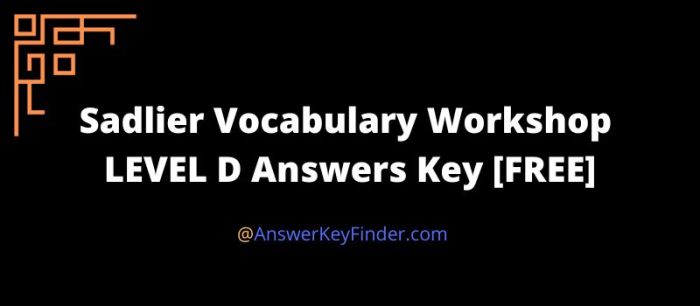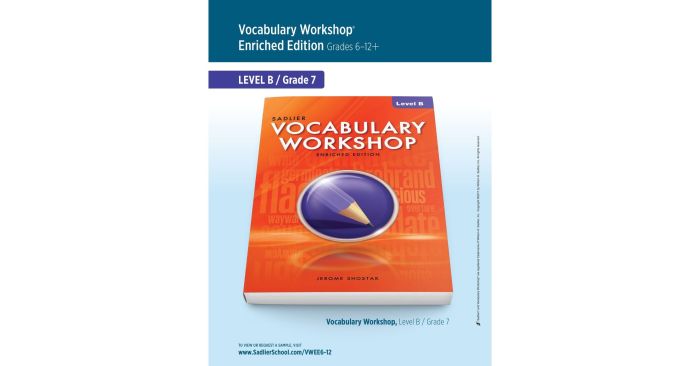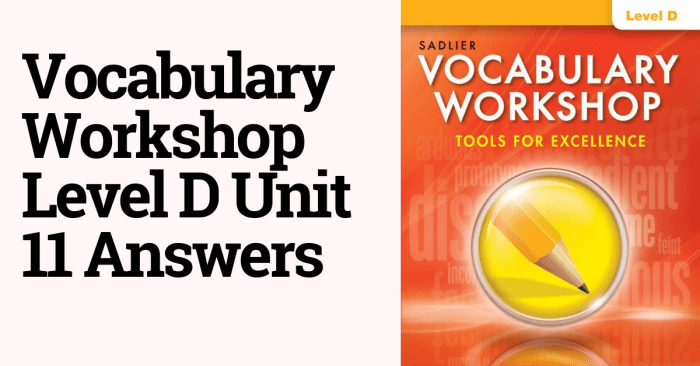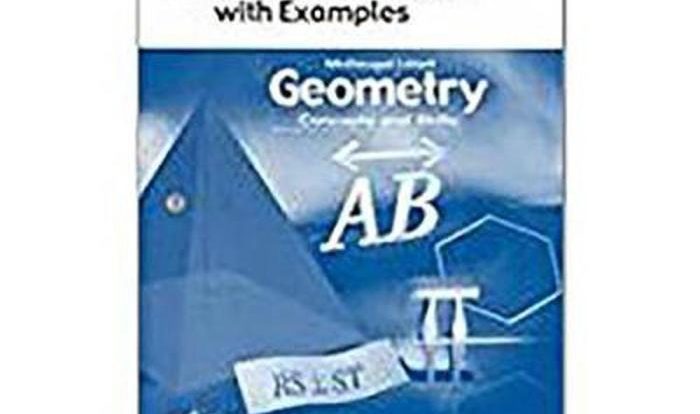Vocabulary Workshop Level D Unit 11 is a comprehensive resource designed to strengthen vocabulary skills. This unit introduces a curated list of vocabulary words, provides clear definitions, and offers engaging activities to reinforce retention. Through diverse examples, interactive exercises, and assessment methods, Vocabulary Workshop Level D Unit 11 empowers learners to expand their vocabulary and enhance their communication abilities.
This unit covers various aspects of vocabulary development, including word usage in context, vocabulary building activities, assessment techniques, and technology integration. By exploring these components, learners gain a deeper understanding of word meanings, improve their word usage, and develop effective strategies for vocabulary retention.
Vocabulary Overview

Unit 11 introduces a range of vocabulary words that expand students’ understanding of various concepts and themes. These words cover diverse subject areas, including science, social studies, literature, and everyday language.
Word List
- Acronym(noun): A word formed from the initial letters of other words.
- Allegory(noun): A story or poem that can be interpreted to reveal a hidden meaning.
- Amphibian(noun): An animal that can live both in water and on land.
- Analogous(adjective): Similar or comparable in certain respects.
- Atmosphere(noun): The layer of gases surrounding a planet.
- Biography(noun): A written account of a person’s life.
- Catalyst(noun): A substance that speeds up a chemical reaction without being consumed.
- Chronology(noun): A record of events in the order in which they occurred.
- Civilization(noun): A complex society with a high level of cultural and technological development.
- Climate(noun): The average weather conditions in a particular area over a long period of time.
Word Usage in Context

Demonstrating the correct usage of vocabulary words in various contexts is crucial for effective comprehension and application. This section presents sentences and examples that illustrate the words in both written and spoken forms.
Written Examples
- The astutedetective quickly identified the inconsistencies in the suspect’s alibi.
- The benevolentphilanthropist donated generously to local charities.
- The capriciousweather conditions made it difficult to plan outdoor activities.
- The diligentstudent spent hours studying for the exam.
- The ephemeralbeauty of the cherry blossoms was a fleeting delight.
Spoken Examples
- The manager was astuteenough to recognize the potential of the new employee.
- The benevolentdoctor provided free medical care to the underprivileged.
- The weather forecast predicted capriciousconditions with sudden downpours.
- The diligentathlete trained relentlessly to prepare for the competition.
- The ephemeralnature of life was a topic of discussion in the philosophy class.
Vocabulary Building Activities

To reinforce vocabulary retention, engaging activities that foster interaction and retention are essential. These activities can take various forms, including games, puzzles, and interactive exercises.
When designing these activities, it is crucial to consider the target audience’s learning styles and interests. Activities should be challenging enough to stimulate cognitive engagement but not so difficult as to discourage participation.
Games
Games provide a fun and competitive way to practice vocabulary. Some popular games include:
- Charades:Students act out a word or phrase while their teammates guess.
- Pictionary:Students draw a word or phrase while their teammates guess.
- Word Association:Students take turns saying a word that is related to the previous word.
Puzzles
Puzzles challenge students to use their vocabulary skills in a different way. Some common puzzles include:
- Crosswords:Students fill in the blanks with words that fit the clues.
- Word Searches:Students find words hidden in a grid of letters.
- Anagrams:Students rearrange the letters of a word to form a new word.
Interactive Exercises
Interactive exercises allow students to practice vocabulary in a more structured way. Some examples include:
- Flashcards:Students create flashcards with the vocabulary words on one side and the definitions on the other.
- Online Quizzes:Students take quizzes online to test their knowledge of vocabulary.
- Vocabulary Journals:Students keep a journal where they record new words and their definitions.
Vocabulary Assessment: Vocabulary Workshop Level D Unit 11
Vocabulary assessment is a crucial aspect of evaluating students’ understanding and retention of new words. Effective assessment methods should cover both word definitions and usage to provide a comprehensive understanding of vocabulary acquisition.
Assessments can be designed in various formats, such as quizzes, tests, or projects, to accommodate different learning styles and preferences. The choice of assessment method should align with the learning objectives and the specific vocabulary being taught.
Quizzes
Quizzes are short, focused assessments that can be administered regularly to assess students’ understanding of specific vocabulary words and their usage. They typically consist of multiple-choice questions, fill-in-the-blanks, or short answer questions.
Tests
Tests are more comprehensive assessments that cover a wider range of vocabulary words and their usage. They may include a combination of question formats, such as multiple-choice, short answer, and essay questions. Tests provide a more in-depth evaluation of students’ vocabulary knowledge and their ability to apply it in different contexts.
Projects
Projects allow students to demonstrate their understanding of vocabulary in a creative and meaningful way. They may involve creating presentations, writing essays, or designing posters that showcase their vocabulary knowledge and usage. Projects provide opportunities for students to engage with the vocabulary in a deeper and more personalized manner.
Grading Criteria and Rubrics, Vocabulary workshop level d unit 11
Clear grading criteria and rubrics should be established to ensure fair and consistent assessment of students’ vocabulary knowledge. These criteria should Artikel the expectations for each assessment type and the specific skills being evaluated. Rubrics provide a structured framework for assessing students’ performance and providing feedback.
Technology Integration

In the contemporary digital landscape, technology has become an indispensable tool for enhancing vocabulary development. By harnessing the power of digital resources, educators and learners can create engaging and effective learning experiences that foster a deep understanding of new words and concepts.
Technology integration in vocabulary instruction offers a multitude of benefits. Interactive apps, games, and simulations provide a stimulating and gamified environment that motivates students to actively engage with vocabulary. Multimedia resources, such as videos and podcasts, enhance comprehension by presenting words in authentic contexts.
Additionally, technology allows for personalized learning, enabling students to progress at their own pace and focus on areas where they need additional support.
Resources and Tools for Vocabulary Learning
- Online Dictionaries and Thesauruses:Websites like Merriam-Webster and Thesaurus.com provide comprehensive definitions, synonyms, and antonyms, aiding in word exploration and understanding.
- Vocabulary Building Apps:Apps like Quizlet and Vocabulary.com offer interactive games, flashcards, and quizzes that make vocabulary learning fun and engaging.
- Language Learning Platforms:Platforms like Duolingo and Babbel incorporate vocabulary learning into immersive language lessons, providing context and practical application.
- Educational Games:Online games like Word Scramble and Crossword Puzzles challenge students to manipulate words, improving their spelling and vocabulary.
- Multimedia Resources:Videos, podcasts, and interactive simulations from sources like YouTube and TED-Ed provide authentic examples of vocabulary in use.
Challenges and Considerations
While technology offers numerous benefits, its integration into vocabulary instruction also presents some challenges. Limited access to technology and digital literacy gaps can hinder equitable participation. Additionally, over-reliance on technology can lead to passive learning and reduce opportunities for meaningful interaction with teachers and peers.
It is crucial to strike a balance between technology-mediated learning and traditional methods to ensure a comprehensive and effective vocabulary development experience.
FAQ Section
What is the target audience for Vocabulary Workshop Level D Unit 11?
Vocabulary Workshop Level D Unit 11 is designed for learners who wish to enhance their vocabulary skills, including students, professionals, and individuals seeking to improve their communication abilities.
What types of activities are included in Vocabulary Workshop Level D Unit 11?
Vocabulary Workshop Level D Unit 11 offers a range of engaging activities, such as games, puzzles, interactive exercises, and writing prompts, to reinforce vocabulary retention and enhance word usage.
How can technology be integrated into Vocabulary Workshop Level D Unit 11?
Vocabulary Workshop Level D Unit 11 provides guidance on incorporating technology into vocabulary instruction, including resources and tools for vocabulary learning, such as online dictionaries, language learning apps, and interactive vocabulary games.

